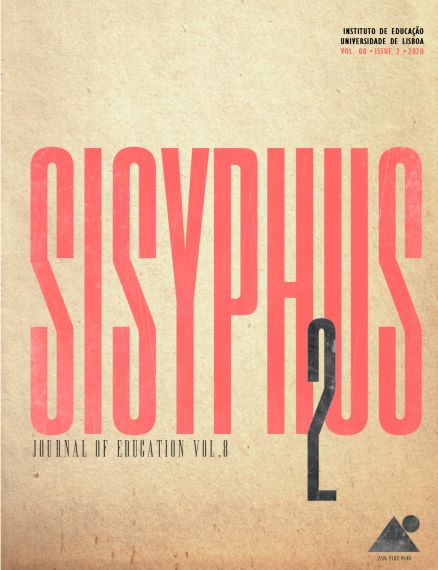Access to University Education in Ecuador
Reforms, Policies and Progress
DOI:
https://doi.org/10.25749/sis.20259Keywords:
higher education, access, Ecuador, young people, universityAbstract
This study explores the reforms and policy implementation with regard to the access of youngsters to higher education in Ecuador in the last decade. Using a descriptive case study approach this article addresses three main questions: What policy reforms were developed to widen the access to higher education in Ecuador? What effects have these policies had on young people in Ecuador? What progress and setbacks has there been in access to Higher education over the past 10 years? An overview of the development of the access to higher education for youngsters and provision by universities in the post-constitution period is provided.
Downloads
References
ALTBACH, P. G., REISBERG, L., & RUMBLEY, L. E. (2009). Access and equity. In Trends in Global Higher Education: Tracking an Academic Revolution (pp. 37-49). Paris: UNESCO.
ASAMBLEA CONSTITUYENTE ECUADOR. (2008). Constitución de la República del Ecuador. Quito: Tribunal Constitucional del Ecuador. Registro oficial Nro. 449. Ecuador.
ASAMBLEA NACIONAL ECUADOR. (2010). Ley Orgánica de Educación Superior. Quito. Ecuador
BANCO MUNDIAL. (2017, 12 de Mayo). La Educación Superior se expande en América Latina y el Caribe, pero aún no desarrolla todo su potencial. Retrieved from: https://www.bancomundial.org/es/news/press-release/2017/05/17/higher-education-expanding-in-latin-america-and-the-caribbean-but-falling-short-of-potential
BELLEI, C., POBLETE, X., SEPÚLVEDA, P., ORELLANA, V., & ABARCA, G. (2012). Situación educativa de América Latina y el Caribe: Hacia la educación para todos al 2015. Oficina Regional de Educación para América Latina y el Caribe.
BROWN, P. A. (2008). A review of the literature on case study research. Canadian Journal for New Scholars in Education/ Revue Canadienne des jeunes chercheures et chercheurs en education, 1(1).
BRYMAN, A. (2016). Social research methods. (5th Edition). United Kingdom: Oxford University Press.
EUROPEAN COUNCIL. (2000). Lisbon European Council 23/24 March 2000 – Presidency Conclusions. European Commission, Lisbon, Portugal.
FERREYRA, M. M., AVITABILE, C., BOTERO ÁLVAREZ, J., HAIMOVICH PAZ, F., & URZÚA, S. (2017). Momento decisivo: La educación superior en América Latina y el Caribe. Washington DC: Grupo Banco Mundial.
FINNIE, R. (2012). Access to post-secondary education: The importance of culture. Children and Youth Services Review, 34(6), 1161-1170.
FISZBEIN, A., & STANTON, S. (2018). The Future of Education in Latin America and the Caribbean: possibilities for United States Investment and Engagement. Washington DC: USAID.
FLICK, U. (2009). An introduction to qualitative research. (4th Edition). London, UK: Sage Publications.
GARCÍA, G. (2012). El derecho a la educación, incluida la superior o universitaria, y sus obstáculos, incluido “El plan Bolonia”. Nómadas. Critical Journal of Social and Juridical Sciences, 34(2), 5-19.
GORARD, S. SMITH, E., MAY, H., THOMAS, L., ADNETT, N., & SLACK, K. (2006). Review of widening participation research: Addressing the barriers to participation in higher education. A report to HEFCE by the University of York, Higher Education Academy and Institute for Access Studies. Bristol: Higher Education Funding Council for England.
ISCH, E. (2011). Las actuales propuestas y desafíos en educación: el caso ecuatoriano. Educação & Sociedade, 32(115), 373-391.
LEWIN, K. M. (2007). Improving access, equity and transitions in education: creating a research agenda pathway to access research monograph no.1. (Monograph No.1). Online submission.
MERRIAM S. (1998). Qualitative research and case study applications in education. (1st Edition). San Francisco, CA: Jossey-Bass.
MEYER, H. D. (2013). Reasoning about fairness in access to higher education: Common sense, normative, and institutional perspectives. In H. D. MILLER, E. P. ST. JOHN, M. CHANKSELIANI & M. URIBE (Eds.), Fairness in access to higher education in a global perspective (pp. 13-40). Rotterdam: SensePublishers.
MURAKAMI, Y., & BLOM, A. (2008). Accessibility and affordability of tertiary education in Brazil, Colombia, México and Peru within a global context. Washington D.C.: World Bank.
ONU, A. G. (1966). Pacto Internacional de Derechos Económicos, Sociales y Culturales. ONU. Retrieved from: https://www.ohchr.org/SP/ProfessionalInterest/Pages/CESCR.aspx
OWEN, G. T. (2014). Qualitative methods in higher education policy analysis: Using interviews and document analysis. The Qualitative Report, 19(26), 1.
PACHECO, L., & PACHECO, R. (2015) Evolución de la educación superior en el Ecuador. La Revolución Educativa de la Universidad Ecuatoriana. Pacarina del Sur [revista digital http://www. pacarinadelsur. com/].
PETERS, B. G. (1998). Comparative politics: Theory and methods. (1st edition). New York: NYU Press.
SENESCYT. (2014, 3 de Febrero). El Exámen Nacional para la Educación Superior (ENES) es universal y obligatorio. Secretaría de educación superior ciencia tecnología e innovación. Retrieved from: https://www.educacionsuperior.gob.ec/el-examen-nacional-para-la-educacion-superior-enes-es-universal-y-obligatorio/
SENESCYT. (2018, 5 de Diciembre). Boletín Analítico – Análisis Bimensual. Secretaría de educación superior ciencia tecnología e innovación. Retrieved from: https://www.educacionsuperior.gob.ec/wp-content/uploads/downloads/2019/01/Boletin_Analitico_SENESCYT_Diciembre-2018.pdf
SHAH, M., BENNET, A., & SOUTHGATE, E. (2015). Widening higher education participation: A global perspective. (1st edition). Massachussets: Chandos Publishing.
SMITH, T. W., & STRAHAN, D. (2004). Toward a prototype of expertise in teaching: A descriptive case study. Journal of teacher education, 55(4), 357-371.
SYMEONIDIS, V. (2019). Teacher competence frameworks in Hungary: A case study on the continuum of teacher learning. European journal of Education, 54(3), 400-412.
ULRIKSEN, M. S., & DADALAURI, N. (2016). Single case studies and theory-testing: the knots and dots of the process tracing method. International Journal of Social Research Methodology, 19(2), 223-239.
UNESCO (1998). Conferencia Mundial sobre Educación Superior: La educación superior en el siglo XXI. UNESCO, Paris, Francia.
UNITED NATIONS. (1948). Universal declaration of human rights. UN General Assembly, 302(2).
VAN HOOF, H. B., ESTRELLA, M., ELJURI, M. I., & LEÓN, L. T. (2013). Ecuador’s higher education system in times of change. Journal of Hispanic Higher Education, 12(4), 345-355.
YIN, R. K. (1994). Case study research: Design and methods. (2nd Edition). Newbury Park, CA.: SAGE Publications.
Downloads
Published
Issue
Section
License
Copyright (c) belongs to Sisyphus - Journal of Education. However, we encourage issued articles to be published elsewhere, provided that Sisyphus authorization is asked for and that authors integrate our original source citation and a link to our website.
Author Self-Archiving Policy
Author(s) are permitted to self-archive the final published version in institutional or thematic repositories, and in their personal or institutional websites.
DORA Signer
The Instituto de Educação da Universidade de Lisboa, Sisyphus' Publisher, is a San Francisco Declaration on Research Assessment signer.






